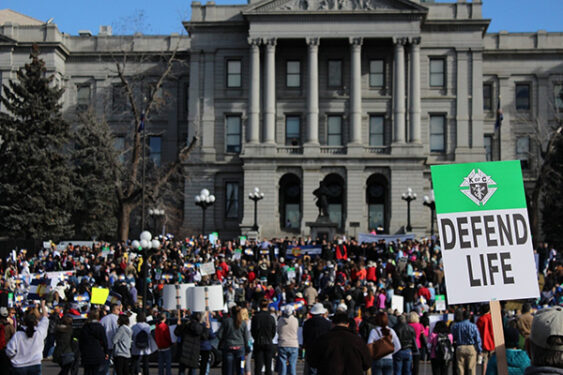
DENVER (CNS) — The Colorado Catholic Conference, the public policy arm of the state’s Catholic bishops, issued an action alert calling on pro-life supporters to make their objections known to a bill it said “could make Colorado the most radical abortion state in the country.”
The conference also noted the measure, the Reproductive Health Equity Act, was “rushed to a committee hearing” March 9.
The rushed hearing “is intended to suppress the voices of millions of Coloradans who oppose the murder of children through abortion,” the conference said. “If enacted, the RHEA will codify (into state law) abortion up-to-the moment of birth for any reason.”
This would permit:
— On-demand abortion for the full 40 weeks of a pregnancy.
— Abortion based on discrimination of sex, race, or children with disabilities such as Down syndrome.
— Remove the requirement that parents of minors be notified if their minor receives an abortion.
— Enshrine in law that “a fertilized egg, embryo, or unborn baby does not have independent or derivative rights under the laws” of Colorado.
— Prohibit any regulation of abortion based on concerns regarding the health of the woman or baby.
Three Democratic lawmakers — Sen. Julie Gonzales, Rep. Meg Froelich and House Majority Leader Daneya Esgar — co-sponsored the bill, also known as H.B. 22-1279.
At a rally in front of the state Capitol in early December, Gonzales said it was time “to ensure that Colorado is truly a legal and safe place for anyone seeking access to their right to reproductive care.”
in a statement posted with its action alert on its website, https://cocatholicconference.org, the Colorado Catholic Conference noted that in 2020, nearly 150,000 Coloradans put Proposition 115 on the ballot, “which, if it had passed, would have prohibited abortion after 22 weeks gestation when the child is viable.”
The conference said the number of voters who signed the petition to get the ballot indicates voters’ objections to abortion on demand.
“Yet at the same time,” it added, “Colorado Planned Parenthood of the Rocky Mountains and other abortion facilities doubled down on making Colorado an ‘abortion destination’ in response to other states passing pro-life laws and the forthcoming Dobbs v. Jackson Women’s Health U.S. Supreme Court decision, which could overturn Roe v. Wade and Planned Parenthood v. Casey.”
The Dobbs case involves a Mississippi law that bans most abortions after 15 weeks. The high court is expected to hand down its ruling in June or July.
In 1967, Colorado became the first state to allow abortion for reasons other than rape or an imminent threat to a woman’s health.
